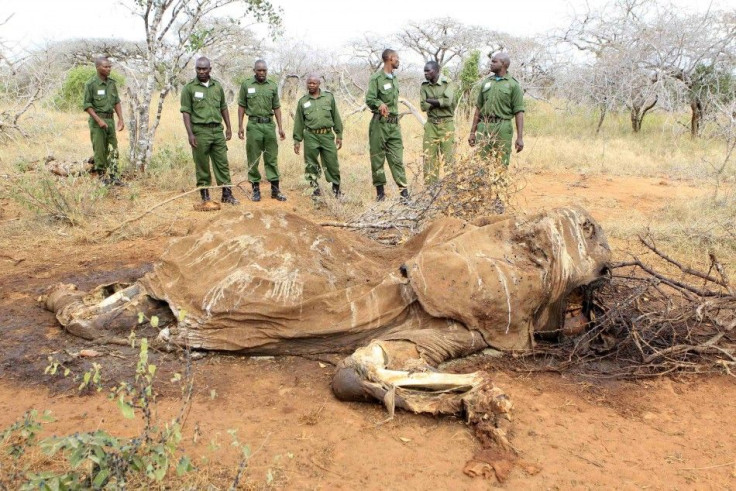Human Exploitation Reduces 52% Of Wildlife Population In 40 Years

People's plunder and activity have caused a decline in wildlife population, a recent report says. With the increasing encroachment of land and resources due to hunting and poaching, the human world has halved the number of wild animals in the world in just 40 years, according to a shocking report released on Tuesday by the WWF's Living Planet Index (LPI). The report is published every two years.
"Put another way, in less than two human generations, population sizes of vertebrate species have dropped by half," Director General of WWF International Marco Lambertini said, according to rt.com. View a gallery of animals that are declining in numbers in The Guardian.
According to the report, Kuwait has the "largest ecological footprint" among nations, which indicates consumption and wastage of more resources per head than any other country. It was followed by Qatar and the United Arab Emirates. America was eighth in the list, behind Denmark, Belgium, Trinidad and Tobago, and Singapore. Ironically, the poorer countries had better sustainability results, including India, Indonesia and the Democratic Republic of Congo.
According to Daily Mail, information on 10,380 animal populations, including 3,038 different species, were collected. The findings show that in the US, fishes have decreased by 83 per cent between 1970 and 2010.
The United States reports declining populations of bumblebees and polar bears, as well as the world's biggest decline in sea life. This was the second largest drop after Latin America, which lost 86 percent around that time. American amphibians had a decline of 73 per cent, while reptiles have fallen by 48 per cent nationwide. Among the most affected is the great white shark of the United States, which has lost about 50 per cent of its population in the last 20 years, mainly due to oil spills in the ocean.
Furthermore, little brown bats have been hit by the white-nose syndrome, which has overtaken seven million since 2006. In some states, the population has fallen by 99 percent. The syndrome infects the bat's body, affecting its heart as well as organs. The reason behind it is not clear, though, the Daily Mail report says.
Additionally, the number of rusty-patched bumblebees, which have pollinated the earth, have vanished 87 percent of the area in the last 25 years. Monarch butterflies have fallen by 90 percent in the same period.
The worst picture is given to freshwater creatures, including amphibians, river fish and mammals. Average population reductions constitute 76 percent between 1970 and 2010, according to the latest information bank.
Land-dwelling animals as well as sea creatures were down by 39 percent, according to the report. The attacks on their habitat and exploitation through hunting and fishing has led to the decline. As humans use resources more speedily than the planet provides, chopping up forests quickly, catching too much fish and polluting the world, they pose a threat.
Professor Ken Norris, director of science at the Zoological Society of London (ZSL), said that the scale of biodiversity loss to our ecosystems is alarming. "The scale of destruction highlighted in this report should be a wake-up call to us all. We all have an interest, and a responsibility, to act to ensure we protect what we all value: a healthy future for both people and nature," according to David Nussbaum, chief executive of WWF-UK, reports Daily Mail. Nussbaum said that we need to make conscious efforts and choices to select sustainable products, such as fish with the Marine Stewardship Council and timber with the Forest Stewardship Council certifications.
Meat and dairy consumption should be reduced. Professor Jonathan Baillie, director of conservation programmes at ZSL, pointed out that people should think about everything, from recycling to pressuring political and industry leaders, and getting their children to reconnect with nature.
After measuring more than 10,000 representative populations of mammals, birds, reptiles, amphibians and fish between 1970 and 2010, WWF concluded that these populations have declined by 52 percent. The previous report by the same sources revealed a drop of 28 percent between 1970 and 2008. Lambertini rued that we are using nature's gifts as if we had more than just one Earth to use.
WWF said that the Earth has crossed three of out the nine identified "planetary boundaries," which are "potentially catastrophic changes to life as we know it," including biodiversity, carbon dioxide levels and nitrogen pollution from fertilizers. Other resources that are in danger of being crossed include ocean acidification and fresh water phosphorus levels.
Experts warn that it is critical to find solutions to help ourselves, as we are the ones who have created the problem and stand to lose the most amount of resources. According to experts, we can help our world species survive by defending and strengthening the Endangered Species Act and taking various steps to check the plunder in the world.






